Baby Eczema vs. Acne – Unraveling Baby Skin Conditions
Eczema and acne are just two of the many conditions that can affect baby skin. It can be difficult for parents to distinguish between these two common skin conditions and administer the proper care.
This article will clarify the differences between acne and baby eczema while illuminating their causes, signs, and available treatments. In this section, we’ll look at each condition’s characteristics, risk factors for its occurrence, and practical management techniques.
You’ll be better able to address your child’s skin issues and support the comfort and health of their skin if you are aware of the specific characteristics of baby eczema and acne. Discover the best method for your baby’s skincare requirements by delving into the world of baby skin conditions.
What is Eczema?
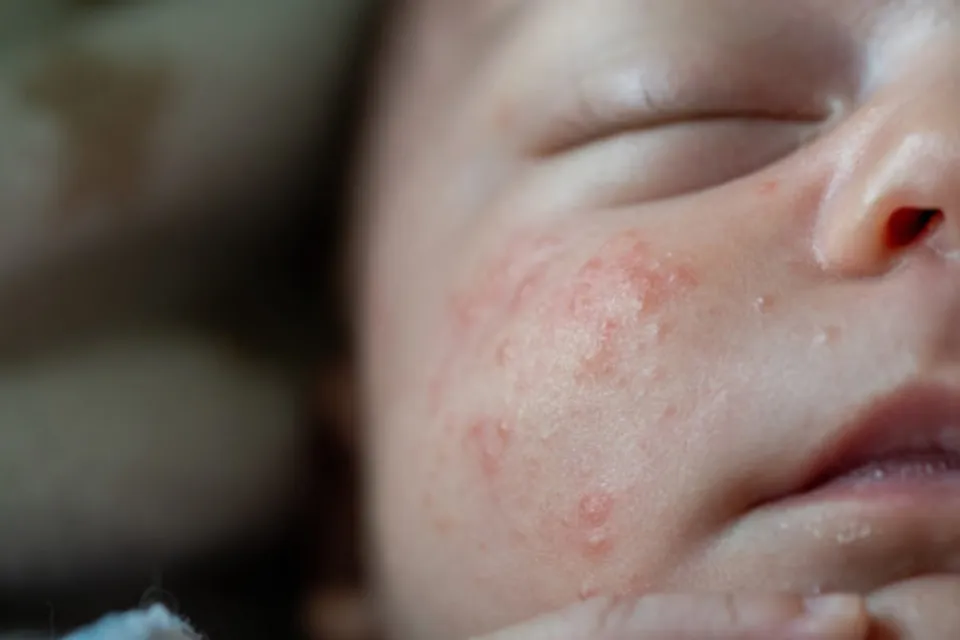
By far, the most typical rash for infants is baby eczema. 9.6 million Americans under 18 are said to have some form of eczema, according to the National Eczema Association. Moderate to severe symptoms are present in one-third of those individuals.
A chronic skin condition that manifests as red, dry, and itchy skin rashes is known as eczema or atopic dermatitis. Baby eczema typically appears in infants between the ages of six and twelve months.
Other symptoms of baby eczema include:
- Appears mainly on the cheeks and scalp
- Red and oozy bumps
- Ranges from mild to severe
- Usually a family history
- Most scarring resolves over time
Read More: Is Vaseline Good for Eczema
What is Baby Acne?
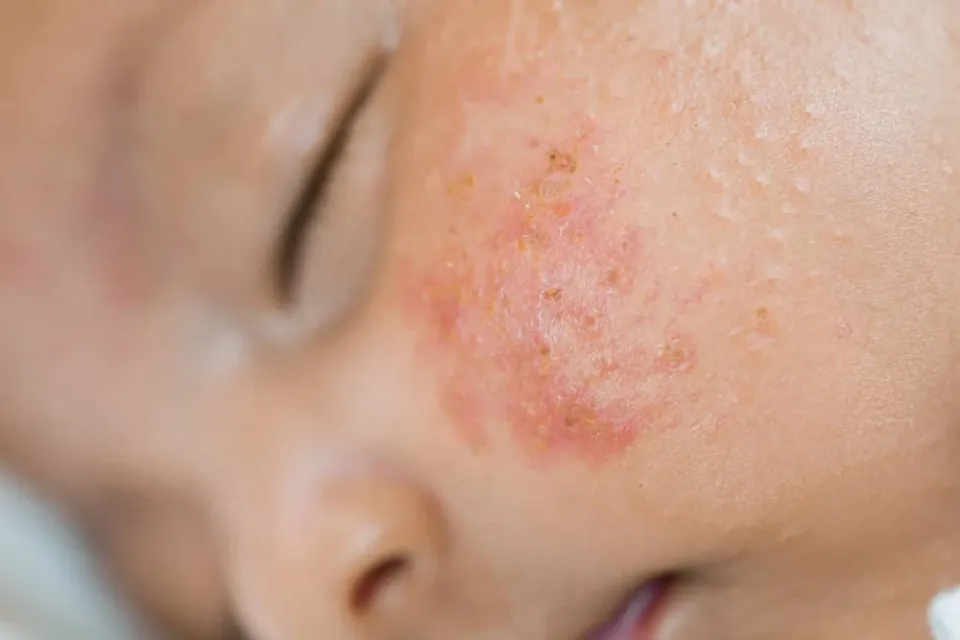
About 30% of newborns experience baby (or neonatal) acne, a treatable condition. While some infants are born with it, others acquire it during the first few weeks of life. Read More: Should I Wake My Newborn to Feed at Night
Infantile acne is defined as acne in infants between the ages of two and one. Blackheads may be present, and it could take longer to clear up.
Symptoms of baby acne include:
- Small red bumps or pimples
- Located on the face or chest
- Lasts a couple of days to weeks
- Temporary
- No scarring
The Difference Between Baby Acne and Eczema
Due to their similar appearance, baby acne and eczema are frequently mistaken for one another. Knowing the essential distinctions between the two skin conditions will help you distinguish between them more quickly.
Appearance
Small bumps known as “baby acne” frequently appear on the face. You may notice dry, flaky patches of skin in addition to bumps if you have eczema. Keep an eye on your child’s skin to see if they’re scratching or itching; while baby acne doesn’t itch, itch is a major symptom of eczema.
Area of the Body
On the forehead, chin, and scalp, both baby eczema and acne commonly manifest. In contrast, the chest, back, and neck are frequently affected by baby acne. In contrast to acne, eczema frequently affects the elbows and knees.
Age
Eczema typically appears before baby acne. Neonatal acne appears in newborns six weeks after birth. Baby eczema typically doesn’t appear until the child is 3 to 6 months old.
Consult your child’s pediatrician or a board-certified dermatologist for a precise diagnosis. In order to ensure an appropriate treatment strategy, they can diagnose your child based on their particular skin.
How to Treat Baby Acne
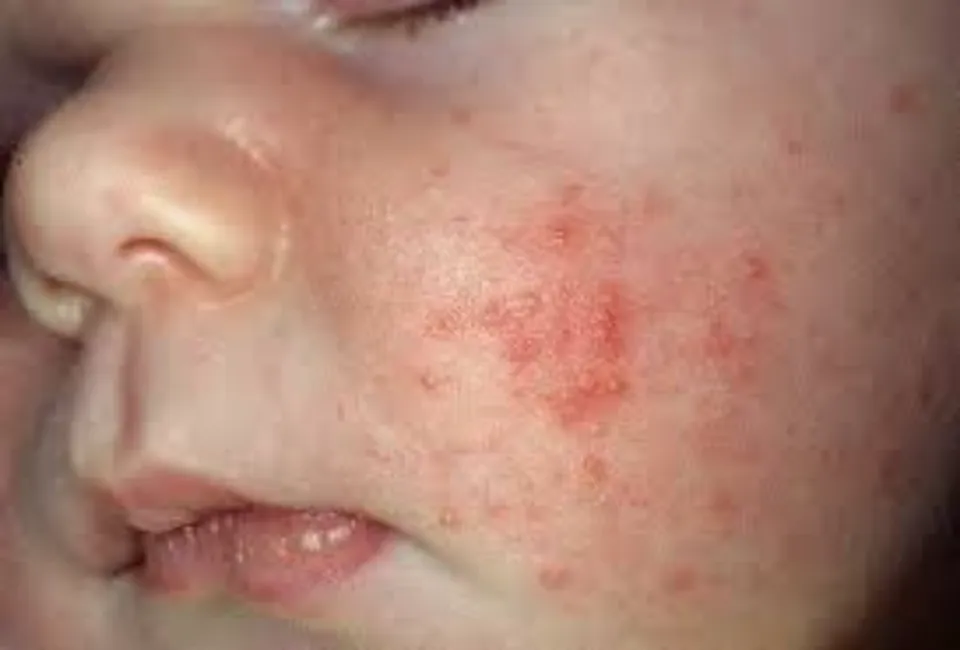
Neonatal acne typically doesn’t need to be treated. Usually, within a few weeks to months, it goes away on its own. Avoid cleansers and soaps that contain fragrances and aren’t made for baby skin to help prevent acne or irritation from getting worse. To dry your baby’s skin, pat rather than rub. To prevent drying out your skin, avoid over-washing it. Do not use oily skincare products either, as they can clog pores. Last but not least, never give your baby adult acne medication; only use products made specifically for baby skin.
How to Treat Baby Eczema
Many infants overcome their eczema. Even though there is no known cure for eczema, making lifestyle changes and paying attention to your baby’s skin’s overall health can help symptoms and increase comfort for your child.
To minimize eczema flare-ups and soothe uncomfortable symptoms:
- assist in preventing scratching. Rashes are aggravated by scratching. Sharp nails have the potential to split open the skin, which would increase inflammation and infection risk. Keep your child’s nails filed and trimmed. So that they don’t scratch themselves raw, make sure your child is wearing mittens.
- Your child should remain calm. Eczema is triggered and its itching is aggravated by heat and sweat. Don’t over-blanket your baby, and make sure they are dressed in cotton clothing that breathes. Taking a bath should also be quick and easy with warm water.
- Balance the microbiome of your child. One of the main causes of eczema is bacterial imbalances on the skin. Our Eczema Cream for Babies and Kids is formulated gently to restore balance to your baby’s skin microbiome. It is safe for babies 3 months of age and up and is made without steroids or other harsh ingredients.
Prevention of Baby Eczema Vs. Acne
Baby Eczema
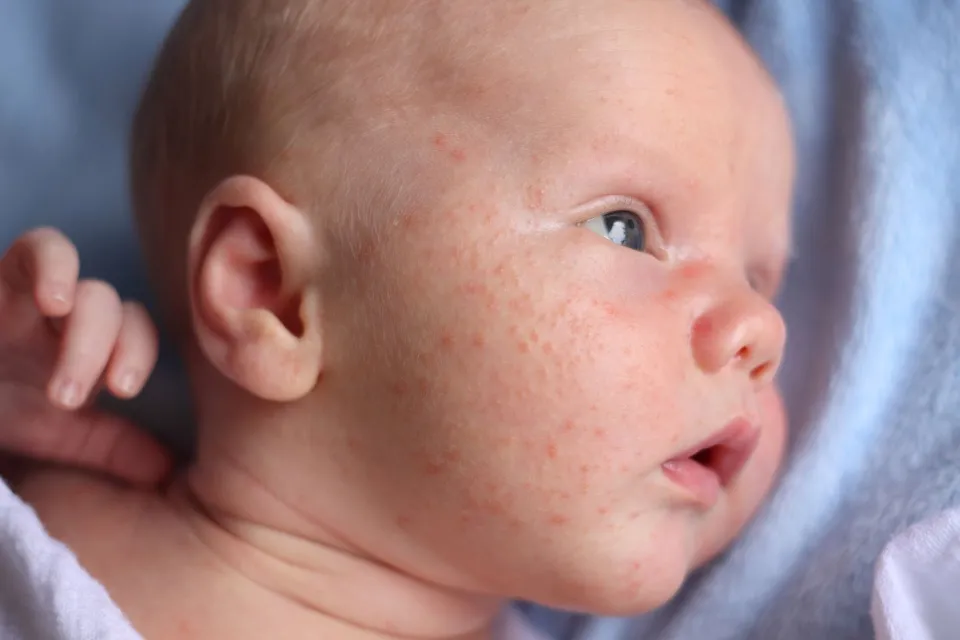
It’s possible to take precautions to prevent baby eczema while you’re expecting or nursing. For instance, some professionals claim that if you consume a diet high in fruits, vegetables, fish, and vitamin D, you can lessen the severity of baby eczema by taking probiotics.
Despite how adorable the little outfits are, your baby’s clothing is frequently a contributing factor in eczema flare-ups once they are born. To lessen irritability, make sure your child wears clothes made of natural materials, like cotton.
For keeping your child’s skin comfortable, choose our Stelatopia Skin Soothing Pajamas. These 100% cotton pajamas use microcapsule technology to continuously supply calming moisture to the skin throughout the night.
Baby eczema should be treated as soon as you notice any symptoms. By doing this, it can be stopped in its tracks and kept from escalating in severity and becoming more challenging to treat.
Additionally, eczema in infants increases the risk of skin infections, which can cause more severe issues in the future.
Baby Acne
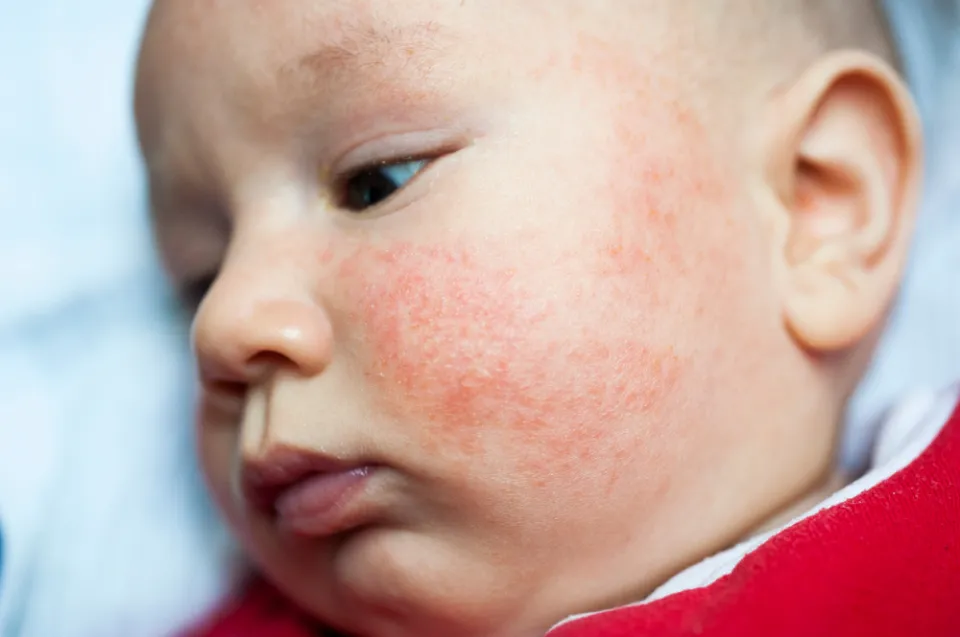
Pediatricians claim that there isn’t really a surefire way to keep babies’ acne under control. The best thing you can do for your child’s skin is to care for it as you normally would.
To safeguard the delicate skin of your baby against any skin conditions, use products with natural skincare ingredients. Mustela provides secure and efficient products for every skin type to help cleanse skin, keep moisture in, and safely treat and prevent infant eczema and acne.
As an illustration, our No-Rinse Soothing Soothing Cleansing Water effectively and delicately cleanses your baby’s face, body, and diaper area while also calming very sensitive skin. Without removing your baby’s skin’s natural oils, it disintegrates dirt and impurities.
Summary
Baby skin conditions like eczema and acne are both fairly common. Rashes and redness are both caused by them. However, baby acne frequently results in pimples that remain on the baby’s face. Different from other skin conditions, eczema results in scaly, itchy patches that can appear almost anywhere on the body. Baby acne typically disappears on its own. Eczema, however, can last for a while and needs to be treated.





Average Rating